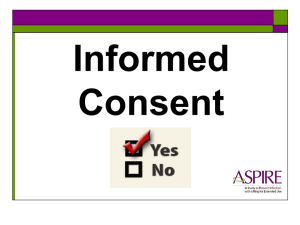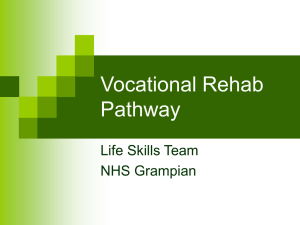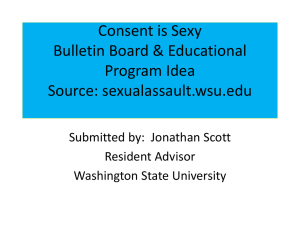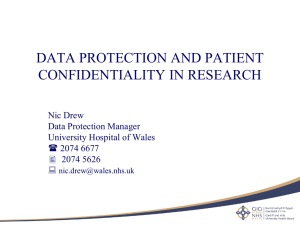Minor`s Rights in Mental Health Care
advertisement
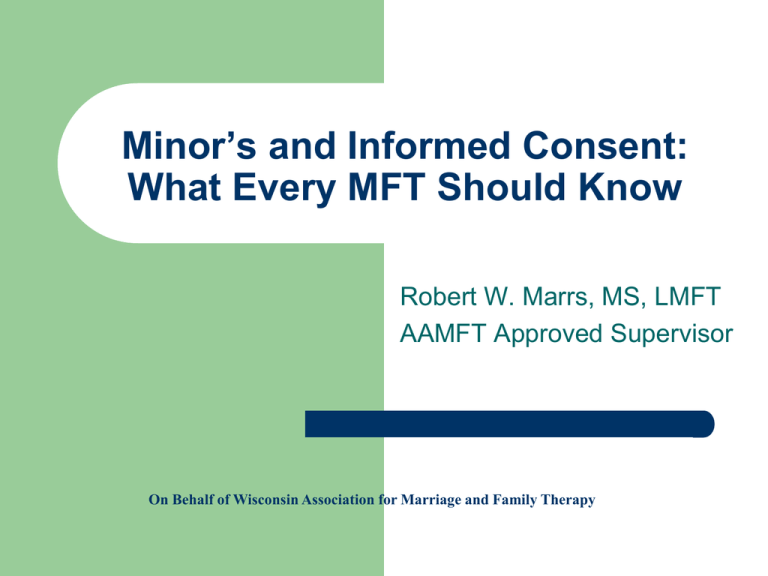
Minor’s and Informed Consent: What Every MFT Should Know Robert W. Marrs, MS, LMFT AAMFT Approved Supervisor On Behalf of Wisconsin Association for Marriage and Family Therapy Minor’s, Informed Consent, & Mental Health Services (Ss. 51.14, 51.30, 51.45, DHS 92) If the child is age 14 years or older, the parent and the child must agree to mental health treatment Either a parent, or a child age 1417, may release the mental health record Parents have a right to access the child’s mental health record until age 18 (unless the parent has been denied periods of physical placement) If the child wants mental health treatment but the parent/guardian refuses, the child may petition a county mental health review officer (MHRO) If the parent/guardian wants treatment but the child refuses, the agency clinic director must petition the MHRO for a review Minor’s, Informed Consent, & Mental Health Services (Ss. 51.14, 51.30, 51.45, DHS 92) The name of the Mental Health Review Officer (MHRO) for your county can be found on the following website: http://www.dhs.wisconsin.gov/clientrights/MHRO.htm Minor’s, Informed Consent, & Alcohol & Other Drug Abuse (Ss. 51.47 / DHS 92:05-06) If the child is age 12 years or older, the child may receive preventive care, diagnostic services, assessment, evaluation, or treatment for drug and/or alcohol abuse, without the parent’s consent, if the facility is licensed, approved, or certified by the state If the child is age 12 or older, inpatient AODA information may not be disclosed without the written consent of both the minor and the parent/guardian If the child is age 12 or older, outpatient and detoxification services may be released with only the consent of the child If the child is age 12 or older, parents may not access the AODA information without the consent of the minor Minor’s, Informed Consent, & Reproductive Health (Ss. 940.04) Minors do not need parent consent to receive the following reproductive health services: – – – – – – Family Planning Pregnancy Testing Prenatal Care Childbirth STD Testing and Treatment HIV Testing & Treatment (14 years of age and older) Minors do need the consent of a parent or guardian to have an abortion, with some exceptions Minors 17 years and older may consent to give blood. 16 years and younger, a parent/guardian consent is required Conversations About Informed Consent It is a standard Outpatient Mental Health Clinic policy that both the parent and adolescent consent to receiving outpatient mental health services. And as a family-based clinic… That both the parent and the adolescent participate in those services Conversations About Informed Consent If the parent is not the legal guardian then the Clinic must receive legal documentation verifying guardianship, and the legal guardian must consent to the mental health treatment prior to receiving services Conversations About Informed Consent Explain to the family that either the parent/guardian, or the adolescent may authorize disclosure of the mental health record to a third party Explain to the minor child that the parent will have access to his/her mental health record until the age of 18 Conversations About Informed Consent If one parent requests that the other parent not be informed about the treatment being provided to the minor child, please explain that unless the other parent has lost his/her legal rights, or that parent has been denied periods of physical placement then that parent has a right to access the minor’s mental health record and be informed of progress in treatment Conversations About Informed Consent Qualified treatment trainees may not provide individual therapy to minors without the permission of a clinical supervisor or the clinic manager Conversations About Informed Consent If individual therapy, or individual sessions are clinically indicated and such indications have been documented in the treatment plan: – – Explain that minors do have an ethical right to privacy and that it may be developmentally appropriate to keep certain information private Explain that minors do have certain legal rights to privacy, particularly around AODA and reproductive health issues Conversations About Informed Consent Be sure that both the parent and the minor understand the exceptions to confidentiality: – – – – – Child abuse or neglect Elder abuse or neglect Vulnerable adult at risk Imminent risk of harm to self or others Court order Conversations About Informed Consent If the family is involved with County Child Welfare, or is receiving County Services, or if the child’s custody is being determined by a court of law, explain that the AAMFT Code of Ethics prohibits MFT’s from providing forensic evaluations, or making legal determinations to the court or to any other body, on behalf of the family they are treating. Other Considerations… Transportation – If certain members of the family are being transported by bus, taxi, or transportation service, please remind them to plan accordingly so that 1) all members are on time for the session, and 2) members will not be left waiting after the session Other Considerations… Child Care – Most clinics do not provide child care. Clinics will need to adopt appropriate policies regarding the attendance of children, particularly if children will be unattended for any period of time. This is to ensure both child safety and clinic liability.


